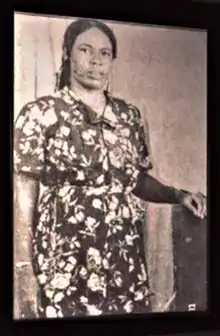Malkat Ed-Dar Mohamed
Malkat Ed-Dar Mohamed Abdullah (Arabic: ملكة الدار محمد عبد الله, Sudanese: [ˈmalkat ɘdːˈãr muħamːad ʔbdˈʌlɑ], 1920 – 17 november 1969) was a Sudanese literary writer, educator and women's rights activist. Her novel witten in the 1950s, The Wide Hollowness, has been characterized as the first Sudanese novel in the style of social realism.

Life and career
She was born in El-Obaid, the capital city of today's federal state of North Kordofan. After completing primary and secondary school, she enrolled in the teachers college in Omdurman and served as a teacher after her graduation. She started learning English on her own, making use of correspondence with teachers of English in Sudan. Having taught in several Sudanese cities, she was appointed inspector for education in Kordofan in 1960. An active member of the Sudanese Women’s Union, Malkat Ed-Dar Mohamed, whose first name translates as "the queen of the house", passed away in 1969.[1]
Literary critic Eiman El-Nour states that the novel "Al-Faragh al-'arid" (The Wide Hollowness) was the first true example of a Sudanese novel in the style of social realism. Written in the first half of the 1950s, but published only in 1970, after the death of its author, the story "depicted for the first time the life of a working woman in Sudanese society." In the same article, El-Nour qualifies this novel as overly romantic and presenting an idyllic image of the Sudanese countryside.[2]
According to literary critic Marcia Lynx Qualey, Malkat Ed-Dar Mohamed won the first short story contest organized by the public Sudan radio station, in 1947 with “Hakim al-Qariya” or “The Village Sage", a story about life in a Sudanese village.[3] Several of her short stories have been published in local and Arab newspapers and magazines. – Sudanese novelist Buthaina Khader Makki said about Malkat Ed-Dar Mohamed that “She was extremely courageous at a time when people were asking women not to be loud and endure oppression."[4]
Select bibliography
- The Mad Woman
- The Village Sage, 1947
- The Wide Hollowness (in Arabic الفرغ العريض), 1970
References
- Katara Prize for Arabic Novel. "ملكة الدار محمد عبد الله". جائزة كتارا للرواية العربية (in Arabic). Retrieved 15 January 2021.
- El-Nour, Eiman (1997). "The Development of Contemporary Literature in Sudan". Research in African Literatures. 28 (3): 150–162.
- Lynx Qualey, Marcia (27 September 2019). "In a Sudan Where Literature is Often Smuggled, the Short Story is a Perfect Form". Literary Hub. Retrieved 13 January 2021.
- Al-Taghyeer Magazine (15 April 2014). "(About Malkat ed-Dar Mohamed Abdullah)حول ملكة الدار محمد عبد الله". صحيفة التغيير السودانية , اخبار السودان (in Arabic). Retrieved 15 January 2021.